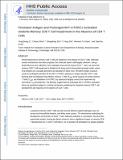Persistent Antigen and Prolonged AKT-mTORC1 Activation Underlie Memory CD8 T Cell Impairment in the Absence of CD4 T Cells
Author(s)
Li, Yingzhong; Shen, Chase; Zhu, Bingdong; Chen, Jianzhu; Shi, Feng; Eisen, Herman N.; ... Show more Show less
DownloadChen_Persistent antigen.pdf (1.675Mb)
OPEN_ACCESS_POLICY
Open Access Policy
Creative Commons Attribution-Noncommercial-Share Alike
Terms of use
Metadata
Show full item recordAbstract
Recall responses by memory CD8 T cells are impaired in the absence of CD4 T cells. Although several mechanisms have been proposed, the molecular basis is still largely unknown. Using a local influenza virus infection in the respiratory tract and the lung of CD4[superscript −/−] mice, we show that memory CD8 T cell impairment is limited to the lungs and the lung-draining lymph nodes, where viral Ags are unusually persistent and abundant in these mice. Persistent Ag exposure results in prolonged activation of the AKT–mTORC1 pathway in Ag-specific CD8 T cells, favoring their development into effector memory T cells at the expense of central memory T cells, and inhibition of mTORC1 by rapamycin largely corrects the impairment by promoting central memory T cell development. The findings suggest that the prolonged AKT–mTORC1 activation driven by persistent Ag is a critical mechanism underlying the impaired memory CD8 T cell development and responses in the absence of CD4 T cells.
Date issued
2015-08Department
Massachusetts Institute of Technology. Department of Biology; Koch Institute for Integrative Cancer Research at MITJournal
Journal of Immunology
Publisher
American Association of Immunologists
Citation
Li, Yingzhong et al. “Persistent Antigen and Prolonged AKT–mTORC1 Activation Underlie Memory CD8 T Cell Impairment in the Absence of CD4 T Cells.” The Journal of Immunology 195.4 (2015): 1591–1598.
Version: Author's final manuscript
ISSN
0022-1767
1550-6606